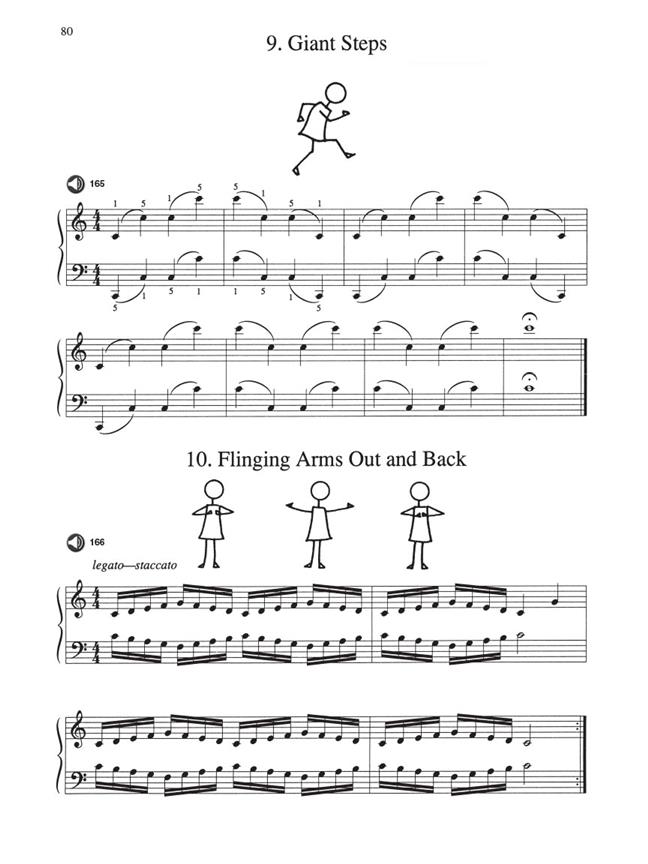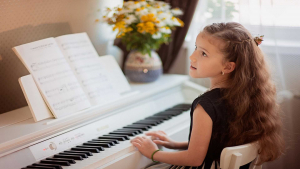Displaying items by tag: lessons
A Dozen A Day - Practice The Old Fashioned Way
Simplicity wins the day!
Learning to play piano with the right fingers and technique can be compared to learning a new language. You need to learn how to crawl, then walk before you run.
If you're looking for a simple and fun way to learn to keep time and develop proper finger dexterity, you need to try the A Dozen A Day series, "Technical exercises for the piano to be done each day BEFORE practicing".

Well, the motto is to the point, and so are the little stick figures that accompany you through your 5-Levels of 12 exercises each. They are very simple to follow, and each module is designed to incorporate elements in music that you'll find in just about any style.

I grew up with this series while taking my conservatory classes. It's nice to see that they're still around today, as I use them extensively with my students over the years. They call it the "stick figure" book, but what's rewarding are the techniques they learn that stick with them for life.
A Dozen A Day is one of the best 12-step programs out there, and I highly recommend them to anyone who wants to be serious about their piano playing.
Sources:
- https://www.halleonard.com/product/414222/a-dozen-a-day-preparatory-book
- https://fr.wikipedia.org/wiki/Edna_Mae_Burnam
- https://www.willispianomusic.com/search/search.action?_c&menuid=14329&seriesfeature=&subsiteid=264
Digital or Acoustic: What Kind of Piano Should You Get
Now that you're interested in taking piano lessons seriously, your next step is choosing a piano that you will bring home to the family!
If you're fortunate, you may already have a piano or keyboard at home. It may not have seen better days, but now that you're taking things seriously it's time to see if you need to do an upgrade or two.
Problem is, there are so many varieties to choose from. It is difficult to know where to start or how much to spend. Then there's the choice between acoustic and digital. Naturally, there are many advantages and disadvantages to both, so I will do my best to list them here. I've had the opportunity to own and use many different kinds of pianos and keyboards, so let my hands be your guide!
Acoustic Pianos
These of course are the traditional kind. There are many varieties and sizes: apartment-size, upright grand, baby grand, concert grand. Now unless you plan on being the next great virtuoso, there are many great apartment-sized pianos you can choose from either new or secondhand.
Advantages
- You get a true stringed instrument with hammer-action keys made of wood and coated with plastic (not ivory).
- You can play music during a power outage.
Disadvantages
- Pianos require tuning at least twice per year in order to keep the tone sounding nice. Stings get to be thrown out of tune with lots of use or heavy play.
- You need to place the piano in an area away from outside walls for proper humidity control. Pianos made of wood will go out of tune if the humidity varies greatly.
- You need to have enough room in your house to place the piano.
- Moving the piano to a different room or house may be costly and cause more detuning.
- Repairs and maintenance are costly.
- High cost of replacement.
Digital Pianos
These have much improved since their inception in the mid 20th century. Digital pianos use an arrangement of sampled sounds from actual pianos to generate the tones you hear when keys are pressed. These are not the same piano sounds generated from a synthesizer. Most inexpensive keyboards offer this lower quality sound such as many in the Casio and Yamaha series of portable keyboards.
Advantages
- Many digital pianos are equipped with a USB/MIDI port for use with connecting to a tablet or computer. This can be used to control software instruments on a tablet or computer to record keystrokes and other electronic music data.
- Can be used in conjunction with a Digital Audio Workstation (DAW) to make multitrack recordings of music with many instruments (keyboard, drums, synthesizer, vocals, etc.)
- Can be moved around with relative ease. Varieties come in the same size as many apartment or baby grand piano styles.
- They do not go out of tune.
- Low cost of replacement,
Disadvantages
- Avoid water at all costs!
- Bad news for you if there's a power failure.
- Lower-quality keyboards have a tendency to break easily.
- Computer connectivity can sometimes be problematic (i.e. driver updates, lack of support, computer hardware issues)
- Motherboards or chips may become defective over time.
Recommendations
Unless you're planning to be a concert pianist, your best bet would be to invest in a good digital piano with weighted hammer-action keys. 88-keys is the standard, however, there are some that come with 76-key and 61-key variations.
The feel is comparable to many good-quality baby grand pianos but without the high price tag and constant maintenance. Roland and Yamaha have good-sounding digital pianos with an excellent feel. They offer full MIDI capability, and when used in conjunction with a DAW such as Logic Pro or Arturia V Piano that come with many fantastic samples of pianos, you will not know the difference and may never look at acoustic pianos the same way.
Getting a piano is a sound investment (no pun intended), and in the end, whether it's an acoustic or digital piano, you win either way as a musician for life!
Simple Tips For Effective Piano Practice
As the old saying goes, practice makes perfect!
Although this is true, we sometimes forget that it's not the quantity or how often we do something, but the quality of the effort we put in each time that makes any practice perfect.
With this in mind, here are a few do's and don'ts to help keep your practice routine fun and rewarding.
Do's
- Just like doing any physical exercise, you need at least a good 20 minutes of practice time to see any lasting results. 30 minutes is ideal. 45 minutes to an hour if you feel you want to push a little more.
- Take a moment to prepare your practice space. Your piano is like your desk at school or study room at home. Try organizing your books and materials to avoid clutter around the piano.
- Make sure you sit with the correct posture at the piano, with your back straight and arms at a 90-degree angle with the keyboard.
- Take a few moments to relax by taking a few deep breaths and releasing the air slowly. Good practice starts with a calm mind. This also helps you to retain what you will learn more effectively.
- When going over a difficult part, take your time and slow down as much as you need. It's not necessary to get everything right on the first try. Going slowly and using a metronome to gradually increase your playing speed will go a long way.
- Put up with distractions. Sometimes you can't avoid having people or distractions while you practice. With patience and a little effort, you can learn to "block out" the noise around you and focus on your lessons.
Dont's
- Don't rush through your practice. Take your time so that you can reward yourself with beautiful music and a job well done!
- Avoid distractions. If there are people around, let them know ahead of time that you intend to do a practice shortly and would like to have as few distractions as possible.
- Don't give up. The only mistake you can make is to not try again.
- Don't over practice. As with all things balance is key.
- Don't be afraid to ask questions. Your teacher is there to help you understand what you need to know.
- Don't stop playing! Once you've gotten the hang of playing piano, make it a permanent part of your life.
To summarize, music practice should never be about just another activity or hobby to pass the time. Our body is like a very complex machine. Music helps to keep all the parts works together and in harmony, because this is how life should be experienced, one measure, one day at a time.
COVID-19 Policy
Dear Friends,
I do everything possible to reduce the risk of transmitting this disease.
For the latest news on the Coronavirus (COVID-19) outbreak please visit the Government of Canada's website, by clicking the link below.
https://www.canada.ca/en/public-health/services/diseases/coronavirus-disease-covid-19.html
Please stay safe everyone, and wear a mask!
- Richard







